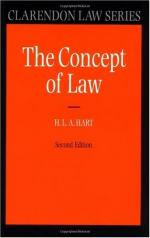
|
| Name: _________________________ | Period: ___________________ |
This test consists of 15 multiple choice questions and 5 short answer questions.
Multiple Choice Questions
1. What would breaking the rule do to society?
(a) Make it stronger.
(b) Hurt it.
(c) Make it more punitive.
(d) Nothing.
2. What do the law of torts specify the conditions of?
(a) Compensation for harms produced by the actions of a few people.
(b) Compensation for harms produced by the society as a whole.
(c) Compensation for harms produced by the actions of others.
(d) Compensation for harms produced by the one own actions.
3. What do Rules of continuity give future individuals the right to?
(a) A fair trial.
(b) Change laws.
(c) Assume the same power.
(d) Ignore the law.
4. What is the first question Hart identified?
(a) Who needs laws.
(b) Who wants laws.
(c) What makes law obligatory.
(d) Who create law.
5. What are rules typically regarded as?
(a) Illegitimate.
(b) Legitimate.
(c) Unavailable.
(d) Universal.
6. Where do many laws originate from?
(a) Custom.
(b) Religion.
(c) Morale.
(d) Precedents.
7. What is the first step in figuring out what law is according to Hart?
(a) What is law.
(b) How are law passed.
(c) Who are law created.
(d) What has confounded so many.
8. How would a man keep law from applying to him, according to Austin?
(a) By making changes to the law.
(b) By ignoring it.
(c) Keep the probability of punishment low.
(d) By being rich.
9. How is law understood, according to the author of Province of Jurisprudence
Determined?
(a) As command.
(b) As constance.
(c) A suggestion.
(d) As requests.
10. When do rules obligate?
(a) When customs failed.
(b) When morale codes are not enough.
(c) When demand for conformity is insistent.
(d) When society organises itself.
11. What aren't laws themselves?
(a) Commands.
(b) Suggestions.
(c) Coerce.
(d) Optional.
12. What is in a sense general?
(a) Legal reach.
(b) Legal retribution.
(c) Legal control.
(d) Legal interpretation.
13. How does Hart qualifies most statements made about law by great minds?
(a) True and deeply puzzling.
(b) Ridicule.
(c) Vague.
(d) Untrue.
14. What do Hart say of making sense of authority in term of sovereign people?
(a) It is stable.
(b) It is problematic.
(c) It is necessary.
(d) It is easy to understand.
15. What would allow all laws to be considered conditional orders to officials to apply sanctions?
(a) Elaborate restatements.
(b) Be sure to have everyone know about the laws.
(c) The ability for the judges to modify laws.
(d) Written laws.
Short Answer Questions
1. What have judges power to do in the structure judicial practice?
2. What are 'real' rules, according to Hart?
3. What is the price of Uniformity?
4. What becomes guides for claims, demands and the like?
5. What do rules requires a critical reflective attitude about?
|
This section contains 464 words (approx. 2 pages at 300 words per page) |

|




